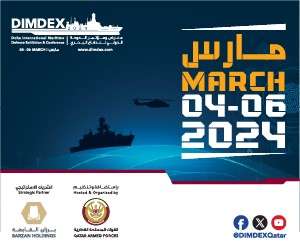The U.S. Navy down selected five ship designs to compete for the FFG(X) Frigate Program on February 16, 2018. Austal USA, Fincantieri Marinette Marine, General Dynamics Bath Iron Works, Lockheed Martin and Huntington Ingalls Industries received a contract award for "conceptual design" of their frigate proposals.
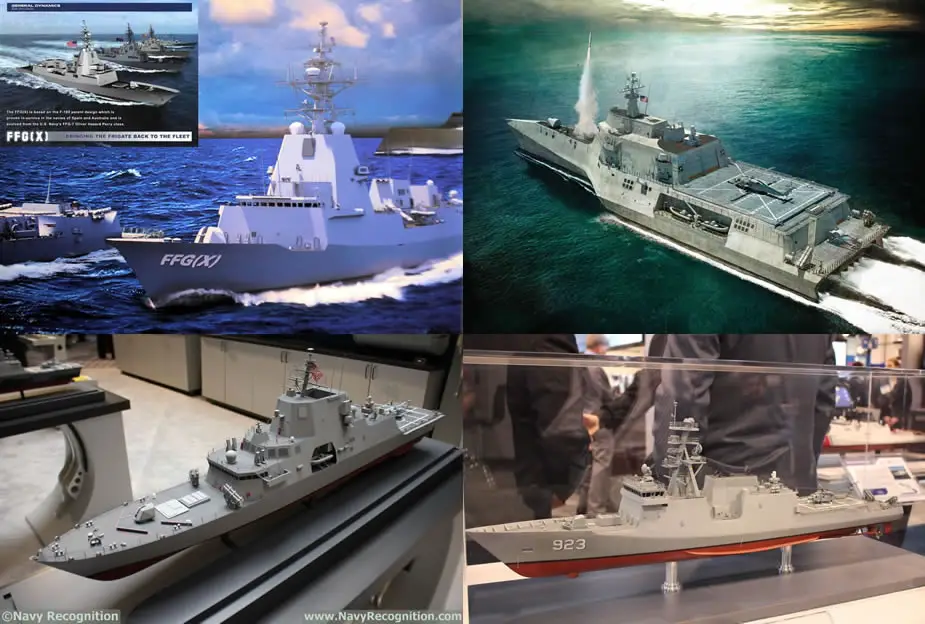 Four of the five FFG(X) finalists
Four of the five FFG(X) finalists
The official list of contract awards can be found at this link. The full list of FFG(X) contender was never disclosed publicly but one of the contenders that hasn't been retained for the down select is Atlas North America / TKMS with the MEKO A-200 design.
The US Department of Defense released a Request for Information (RFI) in July 2017 to let the industry know what the U.S. Navy is expecting from the FFG(X) Frigate. The RFI said, "A competition for FFG(X) is envisioned to consider existing parent designs for a Small Surface Combatant that can be modified to accommodate the specific capability requirements prescribed by the US Navy."
The U.S. Navy wants a frigate that can keep up with carrier strike groups as well as conduct missions on its own. “The FFG(X) will normally aggregate into strike groups and Large Surface Combatant led surface action groups but also possess the ability to robustly defend itself during conduct of independent operations while connected and contributing to the fleet tactical grid.” The U.S. Navy expects the frigate to be survivable in complex scenarios: "FFG(X) will perform its missions in complex electronic warfare and anti-ship missile threat environments".
Video: The five contenders for the FFG(X) next generation frigate program
FFG(X) is an agile, multi-mission platform designed for operation in littoral and blue water environments. Its missions are set to be Anti-Submarine Warfare, Surface Warfare, Electromagnetic Maneuver Warfare, and Air Warfare. FFG(X) will operate independently or integrated with a Task Force to conduct offensive and defensive Surface, Anti-Submarine, and Air Warfare.
According to the program manager, evolving threats in the global maritime environment drove the U.S. Navy to re-evaluate Frigate requirements and pursue a guided missile Frigate. FFG(X) leverages the proposed capabilities of the original Frigate (FF) program while adding:
• Increased Air Warfare (AW) capability in both self-defense and escort roles
• Enhanced survivability (specifically focused on reduced vulnerability)
• Increased Electromagnetic Maneuver Warfare (EMW) capability
Maximizing capabilities while balancing cost
• “High / Low” mix of surface combatant capabilities to meet the increased challenges of future operating environment
To reduce program risk for Detail Design & Construction (particularly with regard to the integration of warfare system elements and cyber architecture) common U.S. Navy systems will be used (EASR radar, COMBATSS21 combat system, C4ISR systems...) and launcher elements (Mk41 and SeaRAM) while encouraging hull, mechanical, and electrical system commonality with other US Navy platforms. Mature parent designs (ship design that has been through production and demonstrated at sea) are required to produce the most cost effective and capable designs to meet FFG(X) requirements
The program manager explained that Conceptual Design Proposals have now been received, with an award expected in late second quarter FY2018 (probably around March 2018): Four to six conceptual design development contracts will be selected. The current schedule calls for an RFI to be issued in the fourth quarter of FY2019 (summer 2019) with a downselect to a single source scheduled for FY2020.
The U.S. Navy intends to award a Detail Design and Construction contract for the first FFG(X) in 2020, the second ship in 2021 followed by the third and fourth ships in 2022. The "per hull cost" is expected to be $950 millions on average for 20 Frigates in the class.
Overview of the five design that have just been down selected:
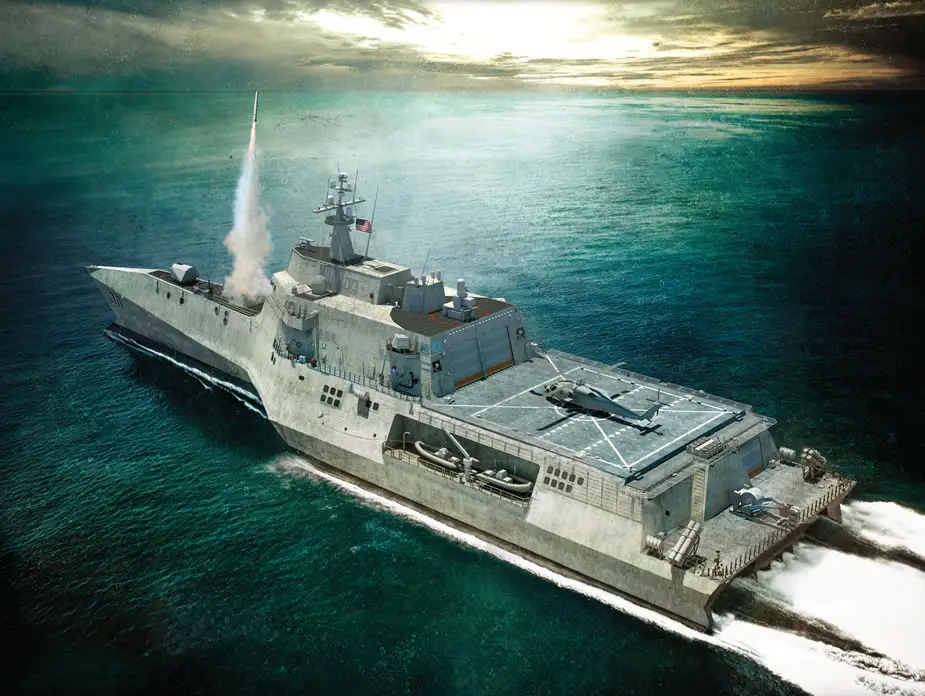 Austal rolled an updated design of its "Austal Frigate" at SNA 2018, reflecting some of the Government Furnished Equipments to be supplied by the U.S. Navy such as Raytheon's EASR radar. Note that the Mk41 VLS have been moved to the bow and stern and the number of anti-ship missiles have been reduced to 8x from 16x. You can easily compare with the earlier design reflected in the picture below. (Austal image).
Austal rolled an updated design of its "Austal Frigate" at SNA 2018, reflecting some of the Government Furnished Equipments to be supplied by the U.S. Navy such as Raytheon's EASR radar. Note that the Mk41 VLS have been moved to the bow and stern and the number of anti-ship missiles have been reduced to 8x from 16x. You can easily compare with the earlier design reflected in the picture below. (Austal image).
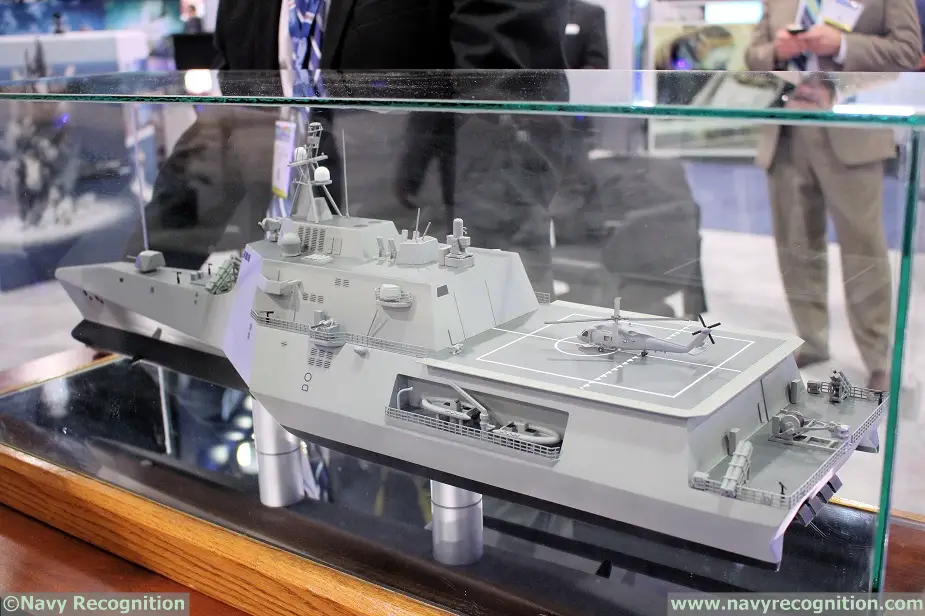
Austal "Austal Frigate"
Compared to the Independence-class LCS (on which it is based), the "Austal Frigate" main modifications consist in a slightly shortened flight deck in order to fit anti-ship missile launchers and a variable depth sonar in order to add capabilities to the ship's aft. Compared to the early design unveiled last year, the latest design show that the 16x Mk41 VLS have been moved forward (just ahead of the bridge) and aft (at the edge of the flight deck). They used to placed on each side of the mast. The new design is fitted with Raytheon EASR radar as expected. The Remote Weapon Stations have been removed as there is currently no requirement for them. The newest design still shows the Thales CAPTAS-4 as the variable depth sonar. We were told this is to show that the Austal Frigate can accommodate the heaviest sonar option. The U.S. Navy still has to select the VDS for FFG(X). A Curtiss Wright / Raytheon VDS was selected for the LCS ASW mission module.
If selected for FFG(X), the Austal Frigate would be built at Austal USA's shipyard in Mobile, Alabama.
The Austal Frigate brochure reads: The Austal Frigate possesses increased lethality and high-speed shallow draft multi-mission combatant capabilities on a seaframe nearly identical to the Independence-variant Littoral Combat Ship. This ship’s ability to meet and exceed current US Navy requirements makes it one of the most cost-effective,maneuverable and flexible ships in the fleet.
Basic specification of the Austal Frigate (from Austal brochure):
Length:. 127.7 m
Beam: 31.7 m
Draught: 4.5 m
Displacement: 3,500 t
Top speed: >32 knots
Range: 4,300 nm @12 knots
Crew: Up to 130 sailors
Austal USA issued the following press release following the FFG(X) contract award.
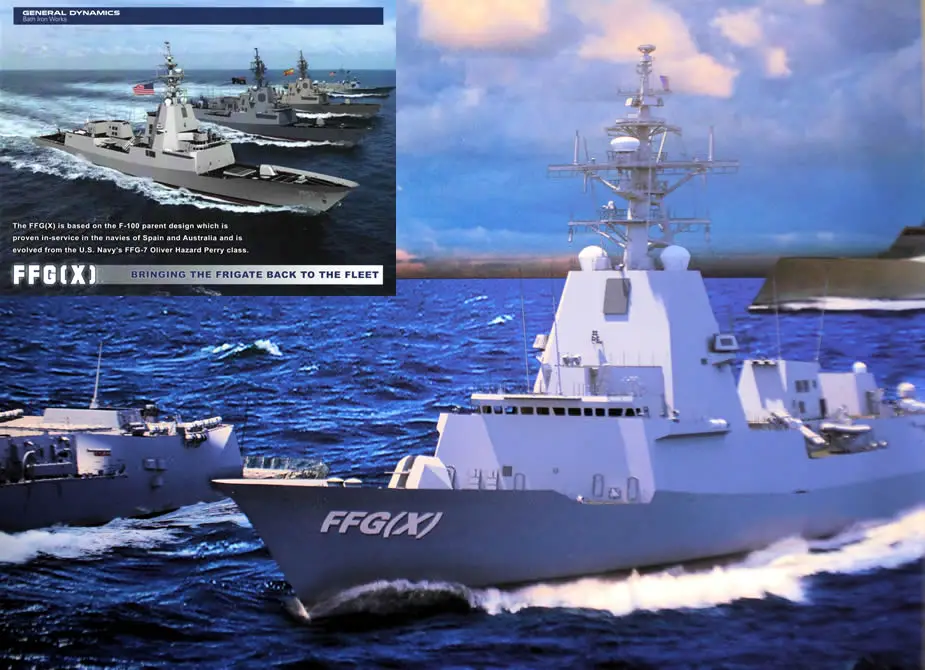 Artist impressions from a poster (main image) and brochure (trop left) showing General Dynamics Bath Iron Works' FFG(X) design at SNA 2018. The frigate is based on Navantia's F100 Frigate design. (GD BIW images).
Artist impressions from a poster (main image) and brochure (trop left) showing General Dynamics Bath Iron Works' FFG(X) design at SNA 2018. The frigate is based on Navantia's F100 Frigate design. (GD BIW images).
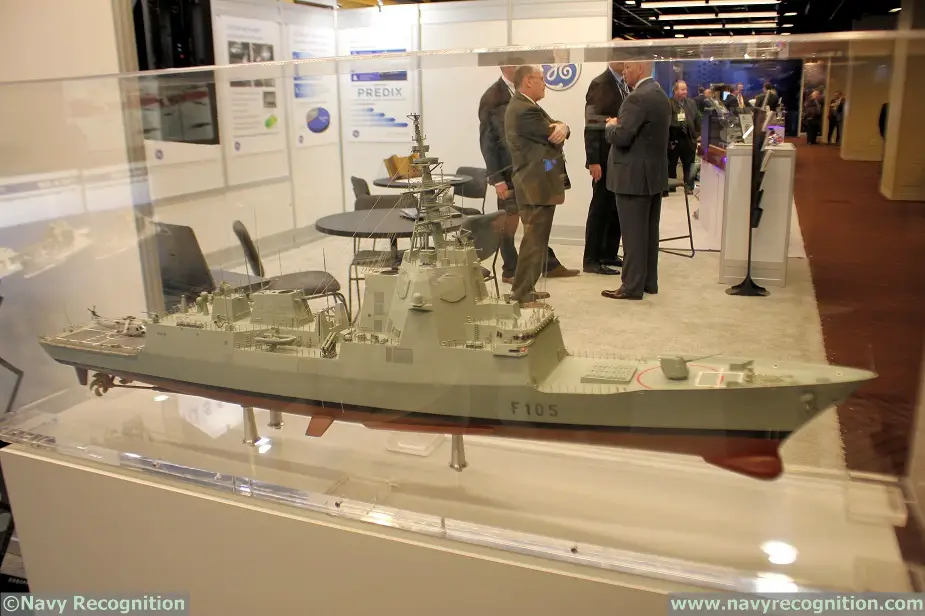 General Dynamics Bath Iron Works stand at SNA 2018 had a scale model of the Spanish Navy Álvaro de Bazán-class frigate Cristóbal Colón (F105) on display.
General Dynamics Bath Iron Works stand at SNA 2018 had a scale model of the Spanish Navy Álvaro de Bazán-class frigate Cristóbal Colón (F105) on display.
Bath Iron Works (General Dynamics) / Navantia "F100"
BIW is partnering with Spanish shipbuilding group Navantia as well as with Raytheon. Their conceptual design is based on the F100 frigate design. CGIs on a poster and brochure at SNA 2018 show an F100 hull fitted with a Raytheon EASR radar and a Mk110 main gun matching the U.S. Navy requirements. The BIW brochure reads: The FFG(X) is based on the F-100 parent design which is proven in-service with the navies of Spain and Australia and is evolved from the U.S. Navy's FFG-7 Oliver Hazard Perry class. F-100 is the ideal parent ship for FFG(X):
- Proven interoperability with US Navy carrier strike groups
- Already meets US Navy standards for survivability, combatant design features and material selection
- High system compatibility with US Navy.
If selected for FFG(X), those frigates would likely be built at BIW shipyard in Bath, Maine.
Basic specification of the baseline configuration/parent design (from Navantia F100 brochure):
Length:. 146.7 m
Beam: 18.6 m
Draught: 4.75 m
Displacement: 5,900 t
Top speed: 28 knots
Range: 4,500 nm @18 knots
Crew: Up to 234
Navantia issued the following press release following the FFG(X) contract award.
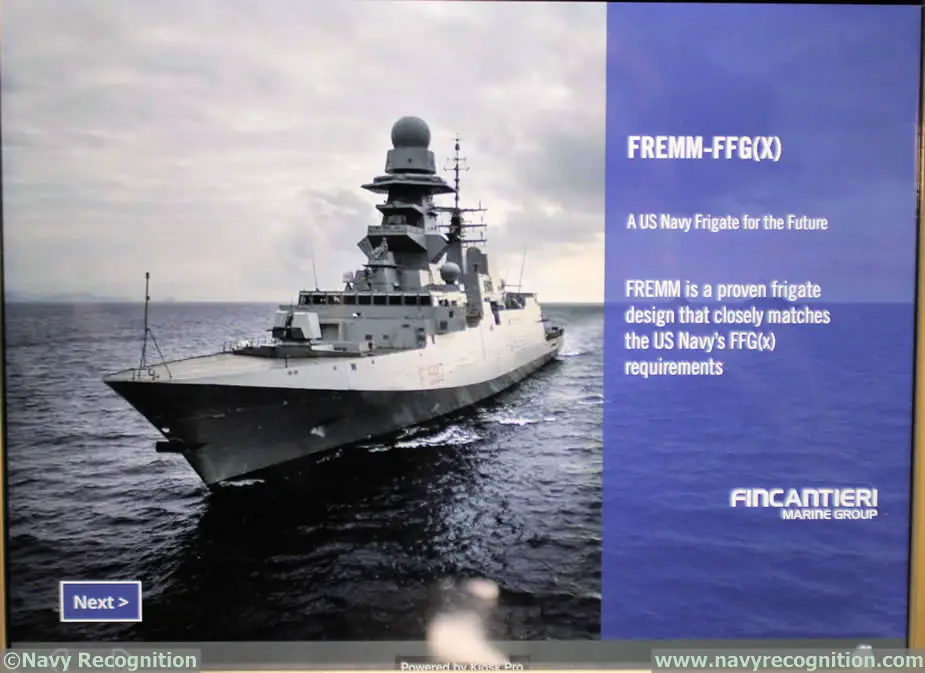 Fincantieri Marine Group stand had a tablet giving some quick facts about the FREMM.
Fincantieri Marine Group stand had a tablet giving some quick facts about the FREMM.
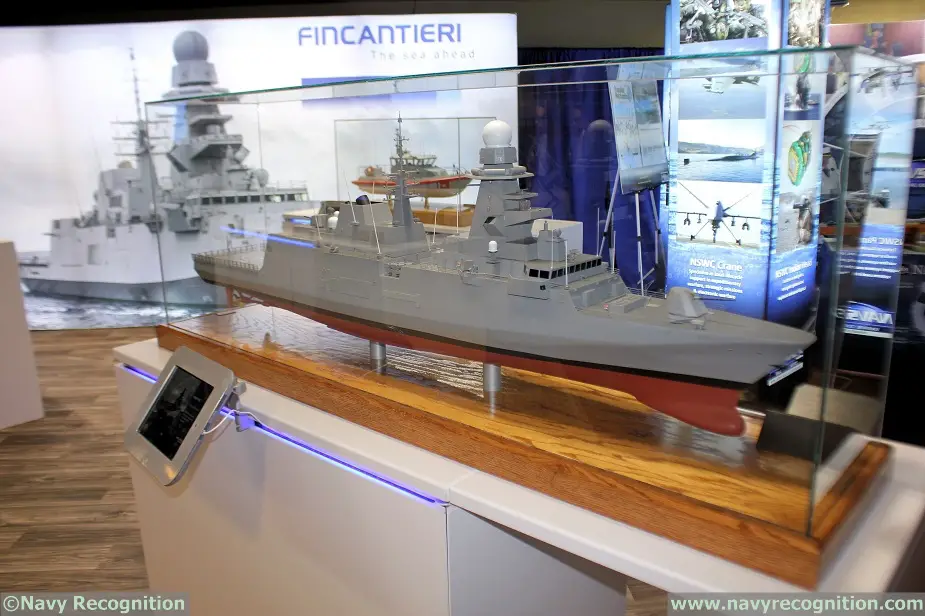 Fincantieri Marine Group stand at SNA 2018 featuring an Italian Navy FREMM scale model and backdrop.
Fincantieri Marine Group stand at SNA 2018 featuring an Italian Navy FREMM scale model and backdrop.
Fincantieri Marine Group / Fincantieri "FREMM"
Fincantieri Marine Group (FMG) and its parent company Italian shipbuilding group Fincantieri are pitching the FREMM. FMG is partnering with US companies Gibbs & Cox and Trident Marine Systems.
A Fincantieri FREMM-FFG(X) brochure reads: Fincantieri is offering FREMM, the most capable and modern frigate in service as the parent hull design for the U.S. Navy's FFG(X).
- 6 FREMM alread in service with the Italian Navy
- Over 30,000 hours and 200,000 nautical miles underway performing real world operations
- Design that has completed construciton 7 times
Fincantieri has assembled an experienced U.S. team (including Gibbs & Cox, and Trident Marine Systems) to carve the ideal path to adapt FREMM to US design standards, while not compromising how FREMM already meets or exceeds all top level thresholds of the FFG(X) requirements.
If selected for FFG(X), the "American FREMM" would be built at Fincantieri Marinette Marine in Marinette, Wisconsin.
Basic specification of the baseline configuration/parent design (from FREMM FFG(X) brochure):
Length:. 143.8 m
Beam: 19.8 m
Draught: 5.48 m
Displacement: 6,500 t
Sustained speed: 26.5 knots
Range: 6,000 nm @15 knots
Crew: 133 (+77)
Fincantieri issued the following press release following the FFG(X) contract award.
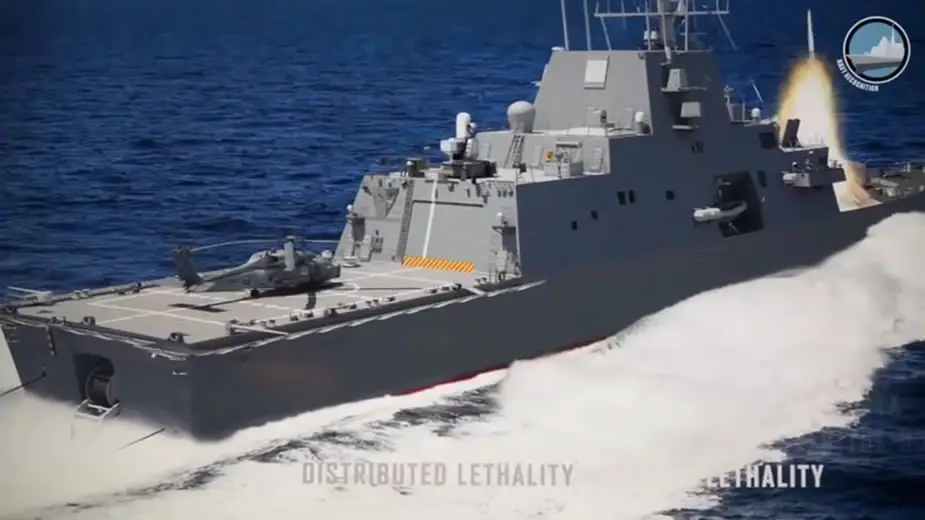 Lockheed Martin stand had a large screen showing an artist impression of its "Freedom-Variant" Frigate.
Lockheed Martin stand had a large screen showing an artist impression of its "Freedom-Variant" Frigate.
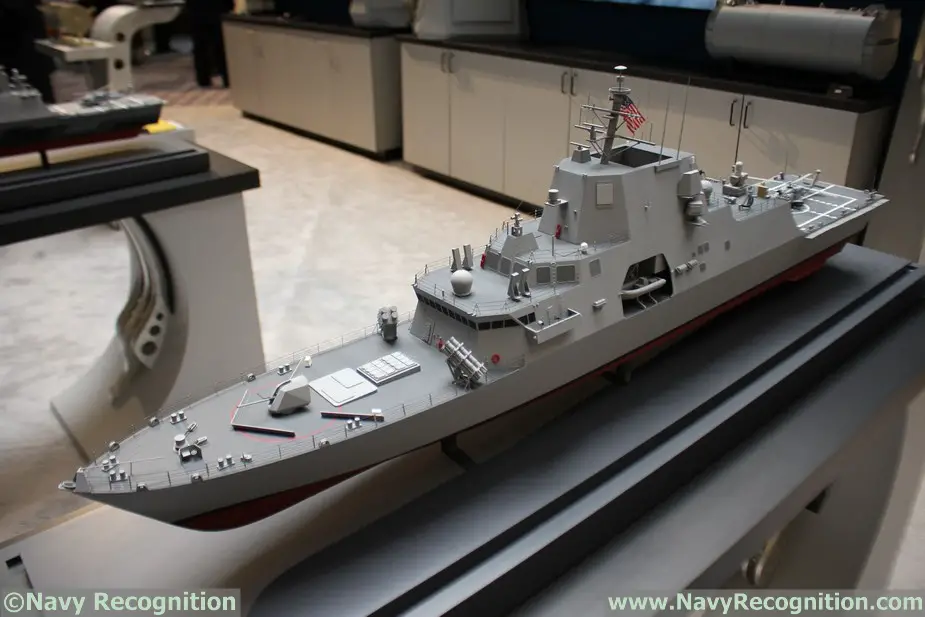 Lockheed Martin "Freedom-Variant" Frigate unveiled at SNA 2018.
Lockheed Martin "Freedom-Variant" Frigate unveiled at SNA 2018.
Lockheed Martin "Freedom Frigate"
Lockheed Martin was the only exhibitor at SNA 2018 to unveil the design of the frigate it is proposing for the U.S. Navy FFG(X) requirement. Unfortunately everyone was tight-lipped on the Lockheed Martin stand. And there was no brochure to give us some basic specifications on the "Freedom Frigate".
Lockheed Martin latest Frigate design is based on the Freedom-class Littoral Combat Ship (LCS). It is our understanding that this frigate uses the 125 meters hull of an earlier design unveiled at DSEI 2017 (for comparison, the LCS measures 115 meters in length). We were told during DSEI 2017 that the crew complement of the 125m vessel was 130 sailors (compared to a crew of 65 sailors on the LCS). Compared to the Freedom-class, the bridge and superstructre of the frigate have been completely redesigned. The bridge face is less slanted / more vertical and the superstructure forms three steps, the last one being significantly higher. This is to accommodate Raytheon's Enterprise Air Surveillance Radar (EASR). For more details about the design you can read our Freedom-Variant Frigate story at this link or watch our video coverage on YouTube.
Lockheed Martin is partnering with Fincantieri Marinette Marine and Gibbs & Cox.
A dedicated Freedom-Variant frigate page published on Lockheed Martin website for SNA 2018 reads: With rapidly evolving threats, world markets need to confront different types of bulls and bears. That’s why Lockheed Martin is evolving its Freedom-variant ship design to confront modern threats to maritime and economic security. The Freedom-variant Frigate offers planners and commanders the strength and affordability needed to rapidly rebuild the U.S. Navy fleet and guarantee freedom of the seas for decades to come.
- Strong solution: With an American-made steel hull, our ship is ready to provide presence around the world for the U.S. Navy.
- Strong team: Anchored by the world’s leading complex systems integrator, we can deliver a lethal, capable and resilient ship.
- Strong economics: Our capable Midwestern ship yard and supply chain support over 12,500 jobs in 42 states.
If selected for FFG(X), the Freedom-Variant Frigate would be built at Fincantieri Marinette Marine in Marinette, Wisconsin.
Basic specification of the baseline configuration/parent design (based on our information from DSEI 2017):
Length:. 125 m
Beam: N/A
Draught: N/A
Displacement: N/A
Top speed: N/A
Range: N/A
Crew: 130 sailors
Lockheed Martin issued the following press release following the FFG(X) contract award.
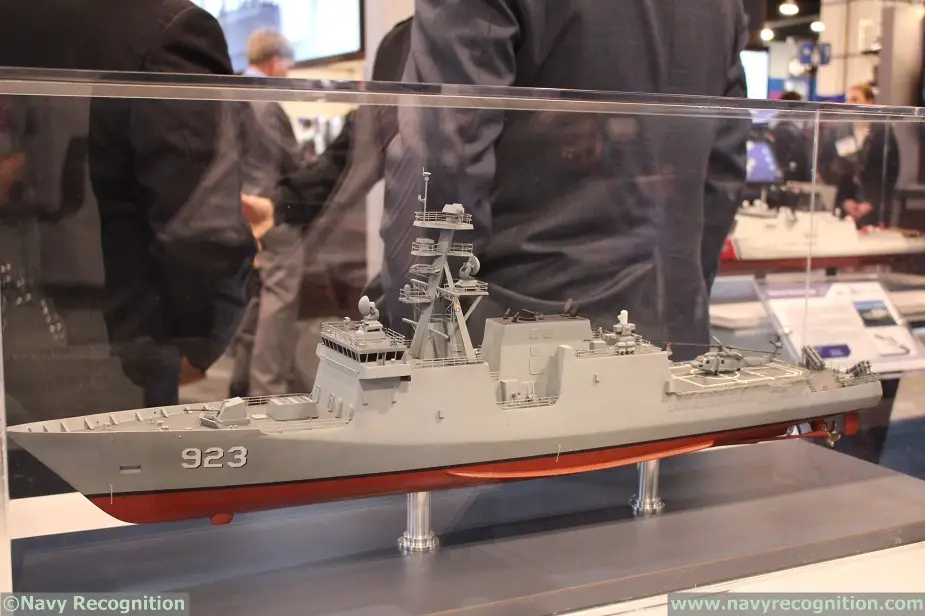
Huntington Ingalls Industries / Ingalls Shipbuilding "Patrol Frigate"
HII kept a very low profile at SNA 2018 and was NOT showcasing a scale model of its FFG(X) conceptual design (not even a poster or brochure of its Patrol Frigate unveiled several years ago) and nobody was willing to discuss the topic. It is still not clear which design HII is pitching for FFG(X) but it is likely to be based on the Patrol Frigate so here is some information about their Patrol Frigate based on information available at previous shows.
Unveiled in 2012, HII Patrol Frigate is based on the National Security Cutter (Legend-class NSC) it is still building for the U.S. Coast Guard. Seven ships are already in service, one under construction and one on order.
An HII brochure on the Patrol Frigate at Sea Air Space 2017 read: The Patrol Frigate Guided Missile (PFG) is a lethal, capable and affordable small surface combatant based on a proven parent hull form. Optimized for Anti-Submarine Warfare, Anti-Surface Warfare and Anti-Air Warfare, the Patrol Frigate incorporates proven weapons systems that maximize combatant capabilities. With extensive range and endurance, the staying power of the Patrol Frigate provides exceptional capability to keep forces forward deployed. Utilizing an existing hull form allows for more efficient production and reduces non-recurring design costs putting ships into the fleet quickly and affordably.
Basic specification of the baseline configuration/parent design (based on HII brochure from 2017):
Length:. 127.4 m
Beam: N/A
Draught: N/A
Displacement: 4,617 tons
Top speed: >28 knots
Range: 8,030 nautical miles
Crew: N/A



